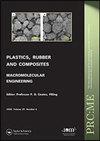Evaluation of waste polyethylene terephalate in polyol and polyurethane production
IF 1.2
4区 材料科学
Q3 MATERIALS SCIENCE, COMPOSITES
引用次数: 0
Abstract
ABSTRACT As technology advances and human population grows, we must meet our diverse needs while minimising harm to the environment. One solution is to prioritise recycling and using second-hand consumer goods. In this study, PET flakes were depolymerised by glycolysis using different molar ratios of glycol such as propylene glycol(PG), triethylene glycol(TEG) and polyethylene glycol(PEG 400) in the presence of two different catalysts: zinc acetate- zinc sulphate. As a result, glycated products (polyols-PO) were obtained. The obtained polyols were then used to synthesise polyurethane films (PU) via acetone process. The thermal and chemical characterisations of the polyurethane films (PU) were analysed. In similar studies, zinc acetate was used as a transesterification catalyst for the glycolysis process. In this study, the same process was carried out using zinc sulphate and zinc acetate. Zinc sulphate was found to be a cheaper and eco-friendlier catalyst alternative to zinc acetate for the glycolysis process.废聚对苯二甲酸乙二醇酯在多元醇和聚氨酯生产中的应用评价
随着科技的进步和人口的增长,我们必须在满足人类多样化需求的同时,尽量减少对环境的危害。一个解决方案是优先回收和使用二手消费品。在本研究中,使用不同摩尔比的乙二醇,如丙二醇(PG)、三甘醇(TEG)和聚乙二醇(peg400),在两种不同的催化剂醋酸锌-硫酸锌的存在下,通过糖酵解PET薄片。结果得到糖基化产物(多元醇- po)。然后用丙酮法合成聚氨酯薄膜(PU)。分析了聚氨酯薄膜的热、化学特性。在类似的研究中,乙酸锌被用作糖酵解过程的酯交换催化剂。在本研究中,采用硫酸锌和乙酸锌进行了相同的工艺。在糖酵解过程中,硫酸锌是一种更便宜、更环保的催化剂,可以替代醋酸锌。
本文章由计算机程序翻译,如有差异,请以英文原文为准。
求助全文
约1分钟内获得全文
求助全文
来源期刊

Plastics, Rubber and Composites
工程技术-材料科学:复合
CiteScore
4.10
自引率
0.00%
发文量
24
审稿时长
4 months
期刊介绍:
Plastics, Rubber and Composites: Macromolecular Engineering provides an international forum for the publication of original, peer-reviewed research on the macromolecular engineering of polymeric and related materials and polymer matrix composites. Modern polymer processing is increasingly focused on macromolecular engineering: the manipulation of structure at the molecular scale to control properties and fitness for purpose of the final component. Intimately linked to this are the objectives of predicting properties in the context of an optimised design and of establishing robust processing routes and process control systems allowing the desired properties to be achieved reliably.
 求助内容:
求助内容: 应助结果提醒方式:
应助结果提醒方式:


